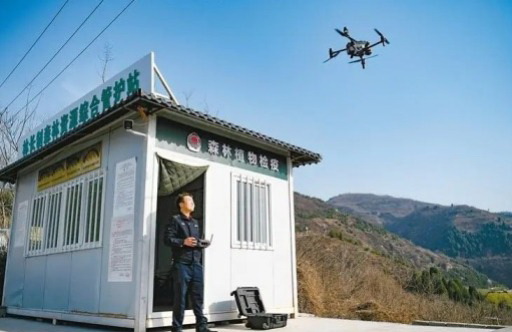Qinling Mountains better safeguarded with comprehensive digital platform
A staff member sends a drone for an ecological patrol to the Qinling Mountains in Lintong district of Xi’an, northwest China’s Shaanxi province. (Photo from Xi’an Daily)
By Zhang Tie, Zhang Danhua, People’s Daily
The Qinling Mountains in northwest China’s Shaanxi province are a natural boundary between China’s north and south in terms of geology, climate, biodiversity, water systems, and soil types.
The unique geographic environment creates abundant moisture, and the rugged terrain harbors rich plant and animal resources, earning the Qinling Mountains the nickname “China’s Central Park” and establishing them as a crucial ecological barrier for the country.
In recent years, ecological protection and restoration of the Qinling Mountains has maintained a priority of Shaanxi province.
“There appears to be waste dumping in the east of Liyuanpo village in Shijing neighborhood,” an alert popped up on the screen of a digital comprehensive monitoring platform for the Qinling Mountains of Huyi district of Xi’an, capital of Shaanxi Province.
Staff member Zhao Na immediately contacted Mao Juan, a local grid officer: “Drones have captured footage, and AI analysis has detected unauthorized dumping.”
In less than an hour, Mao arrived at Liyuanpo village. Upon investigation, she learned that a villager had been renovating his house and had dumped construction waste by the roadside.
She promptly took photos for evidence, uploaded them from her phone, and informed the neighborhood office. After the area was cleared by the following morning, Mao revisited the site, verified the cleanup, and uploaded the update to the platform.
The ecological protection area of the Qinling Mountains covers six districts and counties in Xi’an, accounting for about 55 percent of the city’s total area. The rapid handling of issues like this is a result of an integrated ecological monitoring and protection system for the Qinling Mountains.
The system includes satellites that provide periodic remote sensing images, drones that conduct routine patrol flights, cameras offering real-time monitoring, and 1,240 dedicated grid officers carrying out inspections.
“With this system, countless ‘eyes’ help us protect every ridge and valley of the Qinling Mountains,” said Lei Bo, director of the technology and grid management department of the Xi’an municipal bureau of Qinling ecological environment protection.
From January to August this year, the platform autonomously identified and processed 2,480 cases involving unauthorized construction and dumping. Most cases were resolved within one to three days.
In recent years, Xi’an has continuously improved the systems and mechanisms for regular and long-term protection of the Qinling Mountains. The approach combines human surveillance with technology-based monitoring, and grid-based management with networked coordination, making protection efforts more targeted and intelligent.
Now, the entire landscape can be visualized on a single map, which shows forests, rivers, buildings, and mineral distributions, creates a digital model of the Qinling Mountains.
Each village has its own grid, with at least one grid officer, which forms a four-tiered management system from the municipal level down to villages.
Municipal- and district-level platforms, as well as several industry-specific platforms have been integrated, enabling information sharing and seamless data exchange to form a unified digital supervision system for the Qinling Mountains.
“We can detect even the smallest fire, down to a single lighter, thanks to the integration of thermal, smoke, and light sensors,” said Hua Yiping, director of the Qinling ecological protection and comprehensive law enforcement bureau of Huyi district. The digital monitoring platform now extends to multiple applications, including forest fire prevention, flood control, water quality monitoring, and geological disaster monitoring.
Currently, the populations of wild plants and animals in the Qinling Mountains are steadily increasing, with 99.3 percent of the Qinling area within Shaanxi province now rated as having an excellent ecological environment.
“In the future, we will continue to enhance the automation, intelligence, and precision of Qinling’s protection measures. We aim to refine our monitoring systems and ensure thorough, dynamic inspections and remediation,” said Li Bo, deputy director of the Xi’an municipal bureau of Qinling ecological environment protection.




